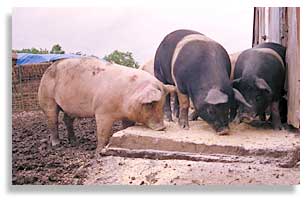|
Hog farmers have not received better prices since the pork checkoff became mandatory by Rhonda Perry Des Moines, Iowa
According to the USDA (United States Department of Agriculture), 15% of the total hog producers and importers (14,986), need to sign the petition in order to call for a referendum. Producers were given about a year to get those signatures. Members of the Campaign for Family Farms plan to deliver the petitions to the USDA in early May. Campaign members are asking the USDA to hold the referendum to end the mandatory pork checkoff within 60 to 90 days."We need a vote right away. We are paying this checkoff every time we sell hogs, and we don&rsqu;ft believe in it." states Larry Ginter, a hog farmer and member of Iowa Citizens for Community Improvement, "Let me tell you, it's taking money out of our pockets that we need to feed our families. It's got to go, and there is no reason to delay the vote" The mandatory pork checkoff program was started in 1986 and collects a portion of the market price when each hog is sold. A farmer who markets 1,000 hogs annually pays about $450 into the checkoff fund (assuming 250 lb. hogs at $.40/lb.). Money collected from this program was originally intended to benefit hog farmers through promotional efforts. However, hog farmers have not received better prices since the pork checkoff became mandatory. In fact, the average annual price has been lower in 8 out of 12 years. In 1986, hog prices were $49.30 per hundred weight. In December 1998, hog prices dropped to $8.00 per hundred weight. Minnesota hog farmer and Land Stewardship member Paul Sobocinski said, "Since the checkoff has been mandatory I've paid in nearly $5,000. What did I get for my money? The lowest hog prices ever and a drastically lower share of the retail dollar. When I collected signatures, hog farmers all said the same thing, "The mandatory pork checkoff has got to go. NPPC has not represented the interests of independent hog farmers." The pork checkoff is benefiting everyone except the hog farmer. Hog farmers' hard-earned dollars are helping meatpackers, advertisers, retailers and are being used to pay the high-priced salaries of the National Pork Producers Council and the National Pork Board. The combined salaries of NPPC CEO Al Tank and NPB Executive Director Mike Simpson, alone, total over a quarter of a million dollars annually. Hog farmers say that the NPPC and the National Pork Board are part of the problem. The NPPC has been spending checkoff dollars to push more and more expansion by the biggest hog corporations, which have increased their sow herds by 50% in the past two years. This massive overproduction has left hog farmers with the lowest prices in history. A recent audit conducted by the USDA&rsqu;fs Office of the Inspector General shows there is a lack of accountability and a lack of control over the NPPC and its use of checkoff funds. The report states that there is not adequate oversight of the checkoff program. It also shows that the NPPC has not been required to track and report how checkoff funds have been spent on each project. "This audit shows what we already know "NPPC is out of control. We need to end the mandatory pork checkoff, now!" states Rhonda Perry, a hog farmer and member of the Missouri Rural Crisis Center. "The hard earned dollars of struggling hog farmers should not be used to support the follies of NPPC executives who are not accountable to anyone." In the last twelve years the National Pork Board has raked in $480,000,000 in checkoff dollars. Meanwhile over 244,000 hog farmers have gone out of business. Earlier in the petition drive, USDA estimated that there were 122,000 hog producers and importers. Since then, the USDA has found there are fewer hog farmers than they thought. The number of producers has been lowered to 99,909. The Campaign groups will keep hog farmers posted on the referendum and urge all eligible hog farmers to come out and vote when the time comes. Member groups of the Campaign for Family Farms include:
* The groups listed above organized and conducted the petition drive to end the mandatory pork checkoff. These other groups have endorsed the petition drive to end the mandatory pork checkoff:
Also read:
Checkoff Funds Scandal:
|
||||||||||||
| Published in In Motion Magazine April 22, 1999. |
||||||||||||
If you have any thoughts on this or would like to contribute to an ongoing discussion in the  What is New? || Affirmative Action || Art Changes || Autonomy: Chiapas - California || Community Images || Education Rights || E-mail, Opinions and Discussion || En español || Essays from Ireland || Global Eyes || Healthcare || Human Rights/Civil Rights || Piri Thomas || Photo of the Week || QA: Interviews || Region || Rural America || Search || Donate || To be notified of new articles || Survey || In Motion Magazine's Store || In Motion Magazine Staff || In Unity Book of Photos || Links Around The World NPC Productions Copyright © 1995-2020 NPC Productions as a compilation. All Rights Reserved. |
||||||||||||


